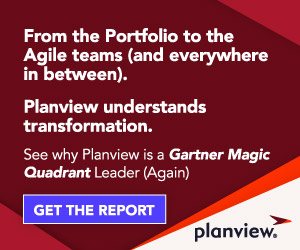There’s no quicker way to sap a truly innovative concept of its power than by turning it into a buzzword. This is part of the story of “Agile,” a term that causes a kind of allergic reaction from some in the business world. But when the word gets thrown around in meetings without any follow-through, can you blame the skeptics?

One way to breathe some life back into the concept of Agile is to differentiate its origins as a product development system from the appropriation of its principles on an enterprise-wide scale. In other words, let’s clarify how Agile project management differs from overall business agility.
What is Agile project management?
As legend has it, Agile project management began in 2001 in the software development world. The so-called Agile Manifesto laid out four core values intended to bring better software to customers with more speed and efficiency.
The Four Values of Agile (from the Agile Manifesto)
- Individuals and interactions over processes and tools
- Working software over comprehensive documentation
- Customer collaboration over contract negotiation
- Responding to change over following a plan
As you can see, these values don’t lay out specific project management principles just yet, but rather a mindset aimed at making product development faster and nimbler through flexibility and collaboration.
Later, the mindset outlined above was further defined in the 12 Principles of Agile. Finally, project managers inspired by Agile software development turned those principles into specific methods for bringing projects to fruition, and Agile project management was born.
What are those methods, exactly? Agile project management tends to focus on:
- Iterative feedback loops: Rather than following a linear plan with fixed timelines and budgets, Agile teams work in smaller iterations, batches, or “sprints” that let them reflect and implement feedback more frequently.
- Increased collaboration: Agile projects depend on the expertise of diverse teams who are in constant collaboration.
- Decentralization of decision-making: Projects move faster when teams are fully mobilized and empowered to take matters into their own hands, rather than funneling power through one central managerial figure.
As with any project management methodology, Agile project management prescribes specific methods for bringing projects to completion. Many Agile frameworks have cropped up to adjust or improve on these methods. For example, the Scrum methodology has its own roles and terms for team members, meetings, and artifacts.
But what all Agile methodologies and frameworks have in common is a focus on adaptability to change.
What is business agility?
As Agile took off and expanded beyond software development, business owners began to see the appeal of increasing agility across entire organizations. Business agility is simply the ability of an organization to adapt to changes quickly and at scale. An agile business focuses on adaptability, efficiency, and collaboration via the following:
- Embracing new processes, policies, and protocols, and staying open to discovery and experimentation
- Effective, efficient, and results-based collaboration within and outside of the organization
- Dynamic, progressive, and demonstrated employee engagement
- Speed plus efficiency – i.e. not just working faster, but working better
Fostering business agility usually amounts to a culture shift before the implementation of any specific, ground-level processes or methods. While true business agility should be evident in employees’ daily habits, an agile business is not necessarily a software company, or a company that only uses the Agile methodology. In fact, business agility has room for all project management methodologies, including hybrid ones.
To learn more about what is (and isn’t) Agile in today’s business world, check out Five Myths About Agile, Debunked.
Agility is the future
Fostering business agility doesn’t have to be painful, and it doesn’t mean you have to abandon your old ways to embrace Agile project management. To learn more about how Planview AdaptiveWork can make your organization more adaptable, schedule a live demo today.










